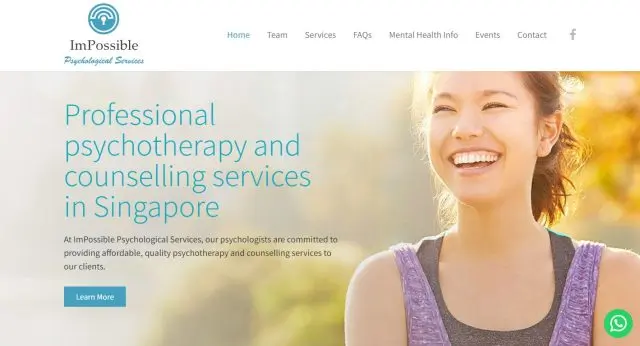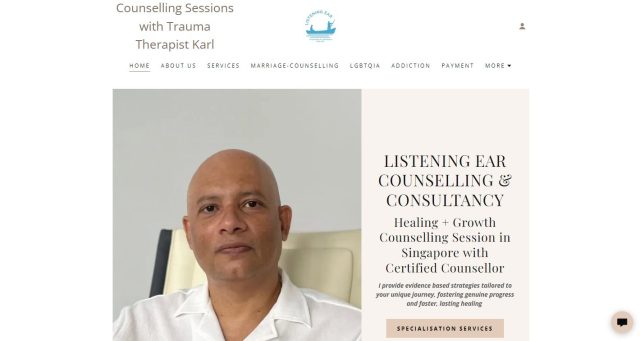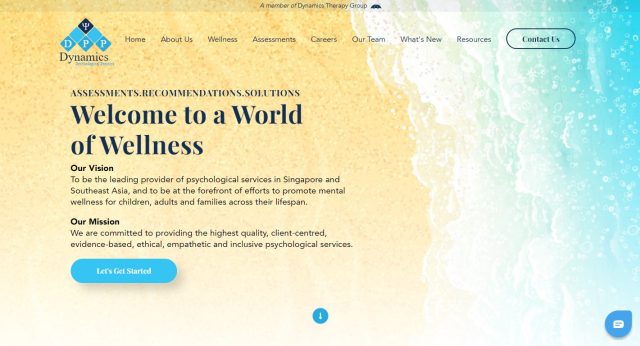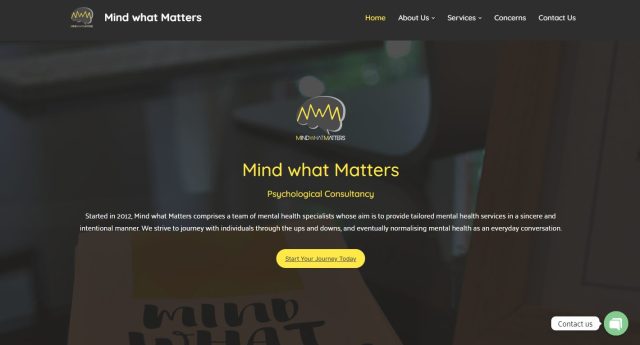5 Best Therapists in Singapore 2024
Based on a survey in 2021, 58.3 percent of Singaporean residents surveyed stated that they were willing to seek help from healthcare professionals for their mental health. This is a good sign as it breaks the stigma and the...

Based on a survey in 2021, 58.3 percent of Singaporean residents surveyed stated that they were willing to seek help from healthcare professionals for their mental health. This is a good sign as it breaks the stigma and the negativity that surrounds people seeking professional help.
This guide lists the top therapists in Singapore, right now. They provide a range of services including therapy for self-worth, support for children and teens, and more, helping families and individuals navigate life’s complexities harmoniously.
What is the difference between counselling and therapy in Singapore?
 Photo: Canva
Photo: CanvaAlthough they are sometimes used synonymously, the phrases “counseling” and “therapy” in Singapore really refer to different types of mental health support, each with a unique focus and duration.
In general, counselling sessions deal with particular problems and circumstances, offering direction and assistance through quick fixes meant to improve a person’s well-being. It frequently focuses on developing interpersonal skills and problem-solving techniques.
However, psychotherapy—which is sometimes just called therapy—goes deeper in its search for the cause and treatment of underlying psychological disorders like anxiety and depression. In order to bring about significant personal change, this type of therapy might be brief but is typically prolonged. It involves more intricate and thorough therapies that examine thought processes, emotions, and prior experiences.
Here are the top five therapists Singapore:
Impossible Psychological Services Little Marvels Therapy Listening Ear Counselling & Consultancy Pte Ltd Dynamics Psychological Practice Mind what Matters5 Best Therapists in Singapore
#1 Impossible Psychological Services
Basic Information
Website: https://www.impossiblepsychservices.com.sg/ Phone Number: 6582686 E-Mail Address: [email protected] Address: 360A Joo Chiat Road Singapore 427605Overview
Couples, adults, young adults, corporate clients, and kids between the ages of 8 and 18 can all benefit from the variety of specialized services provided by ImPossible Psychological Services, well-known for offering psychotherapy and counselling services in Singapore. Their knowledgeable staff specializes in psychotherapy and couples therapy and is well-equipped to address a wide range of mental and life difficulties. The clinic also offers psychiatric evaluations, guaranteeing a thorough approach to mental health.
The clinic takes great pride in its staff of licensed and skilled psychologists and counselors who are committed to providing the best possible therapy. ImPossible Psychological Services guarantees that every client is matched with the most appropriate therapist by utilizing a wide range of therapeutic modalities, such as Choice Theory and Reality Therapy (CTRT), Cognitive Behavior Therapy (CBT), Systemic Family Therapy, and Schema Therapy. They are dedicated to developing customized treatment programs in a private, safe setting in order to successfully address and manage the unique problems of the customers.
#2 Little Marvels Therapy
Basic Information
Website: https://www.littlemarvelstherapy.com/ Phone: 8189 1636 Email: [email protected] Address:Overview
Their fundamental tenet is the understanding that each kid and family is unique, with special needs and dynamics. Taking this to heart, they are dedicated to empowering families and acting as a helpful collaborator in promoting the child’s growth. Their committed group of therapists is prepared to accompany every family on their journey, cooperating to foster a happy, well-rounded child who flourishes in all environments—at home, at school, and in social situations.
Person-centered, family-focused, and research-based techniques serve as the three fundamental foundations around which their system is painstakingly constructed. This trio guarantees that their therapies are not only customized to meet the child’s specific requirements but also include the family as an essential partner in the therapeutic process. Their approach to providing evidence-based treatments that lead to noticeable and substantial changes in the child’s well-being is based on the most recent research.
#3 Listening Ear Counselling & Consultancy Pte Ltd
Basic Information
Website: https://listeningearclinic.com/ Phone: (65) 89502162 Email: [email protected] Address: 10 Anson Road, #28-14 Singapore 079903Overview
Established in 2001 in Singapore by a couple strongly involved in community service and motivated by characters such as Mother Teresa and the film “Patch Adams,” Listening Ear Counselling & Consultancy Pte Ltd is committed to offering top-notch psychological services. This project started out as a deep desire to give back to the community while the founders were still young. It took them to Singapore, the UK, and India on a variety of spiritual and contemplative travels. Their vast background includes managing a hospice that provides palliative care to HIV/AIDS patients in India. After returning to Singapore, they established a sister organization to broaden their influence and reach in the field of mental health services.
The Person-Centred, Family-Focused, Research-Based approach that Listening Ear practices are known for emphasizes the value of enduring, high-quality relationships with oneself, others, and the greater good. In order to support clients in moving ahead into a future of their choosing, their treatment methodology places a strong emphasis on the importance of comprehending and managing these connections via attentive, compassionate listening. This method is customized to meet each client’s specific requirements and is conducted at a pace that respects their comfort level and particular circumstances. It offers a private, safe space where clients can feel heard, seen, and understood without passing judgment, which promotes healing and personal development in a nurturing setting.
#4 Dynamics Psychological Practice
Basic Information
Website: www.dynamics-psychology.sg Phone: +65 6100 9235 Email: [email protected] Address: 583 Orchard Road #15-02 Forum The Shopping Mall S238884Overview
The clinical and educational psychologists at Dynamics Psychological Practice (DPP) in Singapore are licensed professionals with extensive training in their disciplines. The team uses evidence-based techniques and research, adhering to the highest standards of clinical practice and being guided by the Diagnostic and Statistical Manual of Mental Disorders (DSM-V) and the International Classification of Diseases and Related Health Problems (ICD-11). DPP provides a variety of treatments for emotional, behavioral, and mental health issues that impact adults and children. It also does specialized psychological tests, such as tests for ADHD and IQ.
To ensure a comprehensive approach to therapy in a multidisciplinary setting, DPP works closely with other health professionals like occupational therapists and speech-language pathologists. The practice is dedicated to raising client understanding of mental health issues and enhancing intervention techniques, as well as those of the community and their professional team. DPP promotes a welcoming and varied atmosphere, places a strong emphasis on ongoing professional growth and self-care, and works to protect future well-being by enacting preventive measures and pushing for greater access to psychological services. The practice maintains its affiliation with respectable psychological associations while adhering strictly to professional ethics.
#5 Mind what Matters
Basic Information
Website: https://mindwhatmatters.com.sg/ Phone: +65 8907 9590 Email: [email protected] Address: 121 Devonshire Road, 239882Overview
Founded in 2012, Mind what Matters is a group of committed mental health professionals committed to providing individualised mental health treatments with a sincere and purposeful approach. The group is dedicated to helping people navigate the complexity of mental health and hopes to mainstream conversations about mental health as part of daily living. They provide a caring atmosphere, attending to any worries that clients may have, and offering a range of treatment techniques that are customized to meet the specific requirements and circumstances of each person.
Cognitive Behavioral Therapy (CBT), Solution Focused Brief Therapy (SFBT), Dialectical Behavior Therapy (DBT), Mindfulness-Based Therapy (MBT), Emotion Focused Therapy (EFT), Acceptance Commitment Therapy (ACT), Eye Movement Desensitization and Reprocessing (EMDR), and Schema Therapy (ST) are just a few of the many therapy options that the practice provides. First, a comprehensive evaluation aids in comprehending the client’s motivations for pursuing therapy, and then a preliminary diagnosis is developed. Next, in collaboration with the client, treatment programs that meet their expectations and goals are created. For customers who prefer or need remote consultations, Mind what Matters now provides the convenience of online therapy sessions through HIPAA-compliant video platforms.
When should you visit a therapist?
 Photo: Canva
Photo: CanvaDeciding when to seek help from a therapist can be crucial for maintaining mental and emotional health. Here are some situations that indicate it might be time to consult a professional, ranging from feeling overwhelmed to pursuing personal growth.
Feeling Overwhelmed: When daily stressors and responsibilities become too difficult to manage alone, and you’re consistently overwhelmed. Persistent Sadness or Anxiety: If you experience continuous feelings of sadness, hopelessness, or anxiety that don’t seem to improve. Traumatic Experiences: After undergoing a traumatic event, trauma therapy can help in processing and overcoming the associated feelings and stress. Relationship Issues: Whether it’s problems with a partner, family, or friends, therapy can offer strategies to improve communication and relationships. Behavioral Changes: If you notice sudden changes in your behavior, such as increased irritability, sleeping problems, or changes in eating habits. Grief and Loss: During or after experiencing significant loss, such as the death of a loved one, where coping becomes challenging. Substance Use: If you are struggling with substance abuse or other compulsive behaviors that are affecting your quality of life. Personal Growth: Even in the absence of acute issues, therapy can be beneficial for personal development and achieving a deeper understanding of oneself.How do I know a good therapist?
 Photo: Canva
Photo: CanvaChoosing the right therapist is a crucial step in your mental health journey, and there are several key factors to consider to ensure you make the best choice. Comfort and trust are paramount; it’s essential that you feel at ease with your therapist, as a comfortable rapport is foundational to effective therapy. Ask yourself if you feel secure enough to disclose personal details and if the therapist’s demeanor encourages trust.
Communication style and approachability also play significant roles. Evaluate whether the therapist’s communication style aligns with your needs: Are they a good listener? Do they understand and respond to your concerns in a way that you find supportive and empathetic?
Lastly, consider personal compatibility. A therapist’s approach should resonate with your personality and therapeutic needs. It’s beneficial if they are friendly and align with your expectations of what a supportive therapist should be like. Recommendations and reviews from other clients can also provide insight into the therapist’s effectiveness and compatibility, aiding in your decision-making process.
Here are some more qualities you should consider:
Effective Listening Skills: A good therapist actively listens and attentively engages with their clients, showing genuine interest in understanding their concerns. Confidence Inspiring: They instill a sense of confidence in their clients, making them feel secure and supported throughout the therapeutic process. Professional Communication: Good therapists excel in communication, able to clearly convey ideas and empathize effectively. Problem-Solving Focus: They are proactive in addressing issues, not just discussing them but actively seeking solutions. Learning from Experience: Experienced therapists apply lessons learned from previous cases to improve their practice and offer better guidance. Trustworthy Relationship: A strong therapeutic relationship is built on trust, making clients feel like they have a reliable ally in their therapist.How much does a therapist cost in Singapore?
 Photo: Canva
Photo: CanvaThe cost of seeing a therapist in Singapore can vary widely depending on several factors, including the therapist’s qualifications, experience, and the type of therapy provided based on psychological assessments. Generally, fees can range from SGD $100 to $250 per session for a licensed therapist.
More specialized services, such as those provided by clinical psychologists or psychiatrists, might be at the higher end of this spectrum or even more. Some therapists also offer sliding scale fees based on the client’s income to make their services more accessible.
What are the benefits of going to a therapist?
 Photo: Canva
Photo: CanvaVisiting a therapist offers numerous benefits that can significantly enhance one’s mental and emotional well-being. Here are some of the key advantages:
Improved Mental Health: Therapy can help reduce symptoms of mental health disorders such as depression, anxiety, and post-traumatic stress disorder (PTSD), leading to improved overall mental health. Enhanced Self-awareness: Regular sessions with a therapist can increase self-awareness, helping individuals understand their thoughts, emotions, and behaviors more clearly. Better Stress Management: Therapists provide tools and techniques for effectively managing stress, improving one’s ability to cope with life’s challenges. Improved Relationships: Through therapy, individuals can improve communication skills, resolve conflicts, and strengthen relationships with friends, family, and partners. Personal Growth: Therapy encourages personal development and growth, helping individuals set and achieve personal goals and improve their quality of life. Emotional Healing: Therapists assist in processing and healing from past traumas, grief, or emotional injuries, facilitating a healthier emotional state. Behavioral Changes: Therapy can help modify harmful behaviors, such as substance abuse or negative coping mechanisms, fostering healthier lifestyle choices.What type of therapist is most effective for me?
 Photo: Canva
Photo: CanvaThe effectiveness of therapy largely depends on the individual’s specific needs, their particular mental health issues, and personal preferences. There isn’t a one-size-fits-all answer to which type of therapy is most effective as different approaches work better for different people. Here are some widely recognized therapeutic methods and their typical applications:
Cognitive Behavioural Therapy (CBT): Highly effective for treating anxiety, depression, and certain eating disorders. CBT focuses on identifying and changing negative thought patterns and behaviors. Dialectical Behavior Therapy (DBT): Originally developed for borderline personality disorder, it’s also effective for treating mood disorders and suicidal behavior. DBT emphasizes balancing acceptance and change, incorporating mindfulness and emotion regulation. Psychodynamic Therapy: Useful for exploring unresolved conflicts and symptoms that arise from past dysfunctional relationships. It helps individuals to understand the root causes of their emotional distress. Humanistic Therapy: Emphasizes personal growth and self-actualization, making it suitable for individuals dealing with self-esteem issues, personal growth, or identity crises. Interpersonal Therapy (IPT): Primarily used for treating depression. IPT focuses on improving interpersonal relationships and social functioning to help reduce stress and distress. Family Therapy: Effective for solving familial issues, improving communication within the family, and addressing behaviors of children and adolescents within their family context. Eye Movement Desensitization and Reprocessing (EMDR): Proven effective for PTSD, EMDR helps patients process and integrate traumatic memories.Conclusion
In conclusion, seeking therapy can profoundly impact one’s mental and emotional health, offering numerous benefits that foster both personal and interpersonal growth. Therapy provides a safe and structured environment where individuals can explore their thoughts and feelings, leading to improved self-awareness and emotional healing. By addressing specific mental health conditions, enhancing stress management skills, and improving relationship dynamics, therapy helps individuals navigate life’s challenges more effectively.
Additionally, therapeutic interventions promote behavioral changes and personal development, empowering individuals to lead more fulfilling lives. Ultimately, the decision to engage with a therapist can be a transformative step towards achieving greater mental well-being and overall life satisfaction.
Best Therapists in Singapore FAQs
What type of therapist is most effective for me?
The most effective type of therapist depends on your specific needs. Cognitive Behaviour Therapy (CBT) is great for anxiety and depression, Dialectical Behavior Therapy (DBT) addresses complex emotional issues, and Interpersonal Therapy (IPT), Family Therapy, or even a Group Therapy is beneficial for relationship issues. The right choice varies based on personal challenges and goals.
How do I know a good therapist?
A good therapist should actively listen, communicate clearly, and create a trusting environment. Look for professionals who are credentialed, follow evidence-based practices, and tailor their approach to individual client needs.
What is the difference between a therapist and a counselor?
Counselors typically focus on short-term issues, providing immediate guidance and support. Therapists delve into deeper psychological work, often dealing with complex mental health conditions and long-term emotional challenges through various therapeutic methods.

 ValVades
ValVades 





































